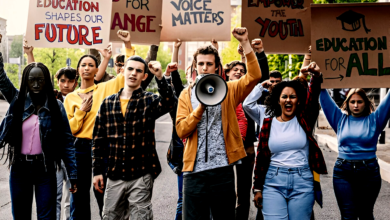
Social media has become a transformative force in modern politics, reshaping how political discourse, campaigns, and public engagement are conducted in the USA and the UK. Platforms like Twitter (now X), Facebook, Instagram, and TikTok have revolutionized the way politicians communicate with voters, how citizens participate in political processes, and how information—both factual and misleading—is disseminated. In the USA, social media played a pivotal role in the 2016 and 2020 presidential elections, while in the UK, it significantly influenced the Brexit referendum and subsequent general elections. This article explores the multifaceted impact of social media on politics in these two nations, examining its role in shaping public opinion, enabling grassroots movements, and challenging traditional media’s dominance. By analyzing the benefits and drawbacks of this digital revolution, we aim to provide a comprehensive understanding of how social media is redefining democracy in the 21st century.
In conclusion, social media has undeniably transformed the political landscapes of the USA and the UK, becoming a double-edged sword that empowers and disrupts in equal measure. On one hand, it has democratized political participation, giving a voice to marginalized groups and enabling grassroots movements to flourish. On the other hand, it has amplified misinformation, deepened political polarization, and raised concerns about privacy and foreign interference. As platforms continue to evolve, policymakers, tech companies, and citizens must work together to harness the positive potential of social media while mitigating its risks. The future of democracy in both nations will depend on how effectively they navigate this digital frontier, ensuring that social media remains a tool for empowerment rather than division.
The Role of Social Media in Modern Politics
Social media has emerged as a powerful tool in modern politics, fundamentally altering how political campaigns are run, how politicians interact with constituents, and how citizens engage with political issues. In the USA and the UK, platforms like Facebook, Twitter, Instagram, and TikTok have become central to political communication, offering unprecedented opportunities for direct engagement between leaders and the public. Politicians no longer rely solely on traditional media outlets to convey their messages; instead, they use social media to bypass intermediaries and speak directly to voters. This shift has democratized political communication to some extent, allowing lesser-known candidates and grassroots movements to gain traction without the need for significant financial resources or media connections.
However, the rise of social media has also introduced new challenges. The speed at which information spreads on these platforms often outpaces fact-checking efforts, leading to the rapid dissemination of misinformation and fake news. In the USA, the 2016 presidential election highlighted politics the extent to which social media could be exploited to influence voter behavior, with foreign actors using targeted ads and fake accounts to sow discord. Similarly, in the UK, the Brexit referendum was marred by allegations of misinformation campaigns and data misuse, raising questions about the integrity of democratic processes in the digital age.
Shaping Public Opinion and Political Discourse
One of the most significant ways social media influences politics is by shaping public opinion and political discourse. Platforms like Twitter and Facebook serve as virtual town halls where citizens can express their views, debate issues, and mobilize around causes. In the USA, movements like #BlackLivesMatter and #MeToo gained momentum through social media, bringing issues of racial injustice and politics gender inequality to the forefront of national conversation. In the UK, social media played a crucial role in mobilizing young voters during the 2017 general election, contributing to a surge in support for the Labour Party.
At the same time, social media algorithms often create echo chambers, where users are exposed primarily to content that reinforces their existing beliefs. This phenomenon, known as “filter bubbles,” can deepen political polarization by limiting exposure to diverse perspectives. In the USA, this has contributed to the growing divide between Democrats and Republicans, while in the UK, it has exacerbated tensions between Remain and Leave supporters in the aftermath of the Brexit referendum. The challenge for policymakers and tech companies is to find ways to promote healthy discourse while minimizing the risks of polarization and misinformation.
The Impact on Political Campaigns
Social media has revolutionized political campaigning, offering candidates new ways to reach voters and mobilize support. In the USA, Barack Obama’s 2008 presidential campaign is often credited with pioneering the use of social media in politics, leveraging platforms like Facebook and Twitter to engage young voters and build a grassroots movement. Since then, social media has become an indispensable tool for political campaigns, with candidates using targeted ads, viral content, and influencer endorsements to amplify their messages.
In the UK, social media has similarly transformed political campaigning. The 2019 general election saw parties investing heavily in digital strategies, using platforms like Facebook and Instagram to target specific demographics politics with tailored messages. The Conservative Party, for example, used data analytics to identify swing voters and deliver personalized content, while the Labour Party focused on mobilizing its base through viral videos and social media challenges. However, the increasing reliance on social media has also raised concerns about transparency and accountability, with critics arguing that the lack of regulation allows for unethical practices like micro-targeting and the spread of misleading information.
Grassroots Movements and Citizen Engagement
One of the most positive aspects of social media’s influence on politics is its ability to empower grassroots movements and enhance citizen engagement. In both the USA and the UK, social media has provided a platform for marginalized groups to organize, advocate for change, and hold those in power accountable. In the USA, the #BlackLivesMatter movement, which began politics as a hashtag on Twitter, has grown into a global force for racial justice, sparking protests and policy changes across the country. Similarly, in the UK, social media has been instrumental in amplifying the voices of young people and activists, particularly in movements like #YouthStrike4Climate and #StopFundingHate.
Social media has also made it easier for citizens to participate in political processes, from signing petitions to contacting their representatives. Platforms like Change.org and 38 Degrees have leveraged social media to mobilize millions of people around causes, demonstrating the power of digital activism. However, the rise of “slacktivism”—where individuals engage in low-effort online actions like liking or sharing posts—has raised questions about the effectiveness of social media-driven activism. While these actions can raise awareness, they often lack the impact of traditional forms of political engagement, such as voting or attending protests.
Challenges and Ethical Concerns
Despite its many benefits, social media’s influence on politics is not without challenges and ethical concerns. One of the most pressing issues is the spread of misinformation and fake news, which can undermine public trust in democratic institutions. In the USA, the proliferation of conspiracy theories and false claims on social media has contributed to a crisis of trust in the media and government. Similarly, in the UK, the spread of misinformation during the Brexit referendum and the COVID-19 pandemic has highlighted the need for greater regulation of online content.
Another concern is the role of social media in facilitating foreign interference in democratic processes. In the USA, the 2016 presidential election was marked by allegations of Russian interference, with foreign actors using social media to spread divisive content and influence voter behavior. In the UK, concerns have been raised about the role of foreign-funded campaigns in shaping public opinion during the Brexit referendum. These incidents have prompted calls for greater transparency and accountability from social media companies, as well as stronger regulations to prevent foreign interference.
Privacy is another major issue, with social media platforms collecting vast amounts of data on users to target them with political ads. The Cambridge Analytica scandal, which involved the unauthorized harvesting of Facebook data to influence voters in the USA and the UK, underscored the risks of data misuse in politics. In response, governments in both countries have introduced new regulations, such as the General Data Protection Regulation (GDPR) in the UK and the Honest Ads Act in the USA, to protect user privacy and ensure transparency in political advertising.
The Future of Social Media in Politics
As social media continues to evolve, its impact on politics in the USA and the UK is likely to grow. Emerging technologies like artificial intelligence and virtual reality could further transform political communication, offering new ways for candidates to engage with voters and for citizens to participate in democratic processes. However, these advancements also come with risks, including the potential for deeper manipulation and the erosion of privacy.
To address these challenges, policymakers, tech companies, and civil society must work together to create a regulatory framework that balances innovation with accountability. This could include measures like requiring social media platforms to disclose the sources of political ads, improving fact-checking mechanisms, and promoting digital literacy to help users navigate the online information landscape. By taking a proactive approach, the USA and the UK can ensure that social media remains a force for good in politics, empowering citizens and strengthening democracy.
Read More: Consumer Protection Laws: How to Fight Back Against Scams
Conclusion
In conclusion, social media has undeniably transformed the political landscapes of the USA and the UK, becoming a double-edged sword that empowers and disrupts in equal measure. On one hand, it has democratized political participation, giving a voice to marginalized groups and enabling grassroots movements to flourish. On the other hand, it has amplified misinformation, deepened political polarization, and raised concerns about privacy and foreign interference. As platforms continue to evolve, policymakers, tech companies, and citizens must work together to harness the positive potential of social media while mitigating its risks. The future of democracy in both nations will depend on how effectively they navigate this digital frontier, ensuring that social media remains a tool for empowerment rather than division.
The challenges posed by social media in politics are significant, but so are the opportunities. By fostering transparency, promoting digital literacy, and implementing robust regulations, the USA and the UK can address the negative impacts of social media while leveraging its power to enhance civic engagement and strengthen democratic processes. As we move forward, the key will be to strike a balance between innovation and accountability, ensuring that social media serves as a force for good in shaping the future of politics.
FAQs
How does social media influence voter behavior?
Social media influences voter behavior by shaping public opinion, spreading information (and misinformation), and enabling targeted advertising. It can amplify certain narratives, mobilize supporters, and even suppress voter turnout through disinformation campaigns.
What role did social media play in the Brexit referendum?
Social media played a significant role in the Brexit referendum by facilitating the spread of misinformation, enabling targeted advertising, and mobilizing supporters on both sides of the debate. It also raised concerns about foreign interference and data misuse.
How do social media algorithms affect political discourse?
Social media algorithms often create echo chambers by showing users content that aligns with their existing beliefs. This can deepen political polarization and limit exposure to diverse perspectives, making constructive dialogue more difficult.
What are the risks of social media in politics?
The risks of social media in politics include the spread of misinformation, foreign interference, privacy concerns, and the erosion of trust in democratic institutions. It can also deepen polarization and enable unethical practices like micro-targeting.
How can the negative effects of social media on politics be mitigated?
The negative effects of social media on politics can be mitigated through stronger regulations, improved fact-checking mechanisms, greater transparency in political advertising, and efforts to promote digital literacy among users.








One Comment